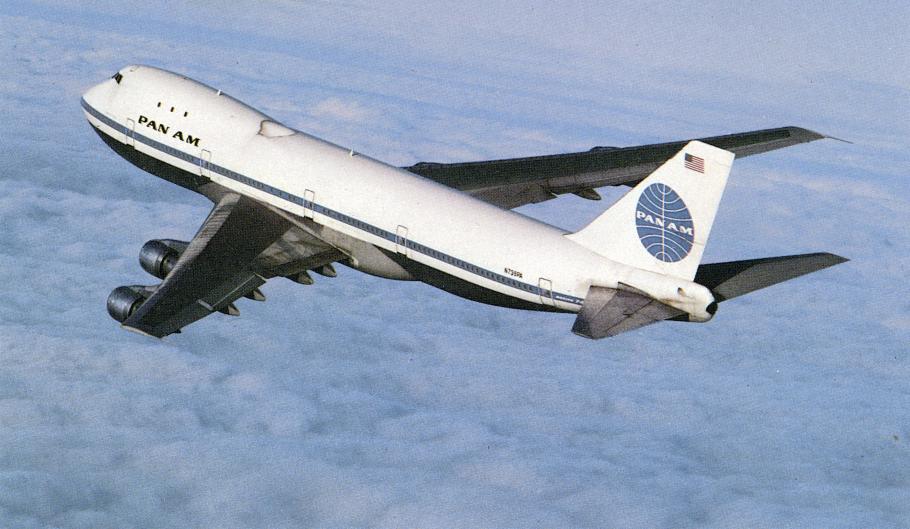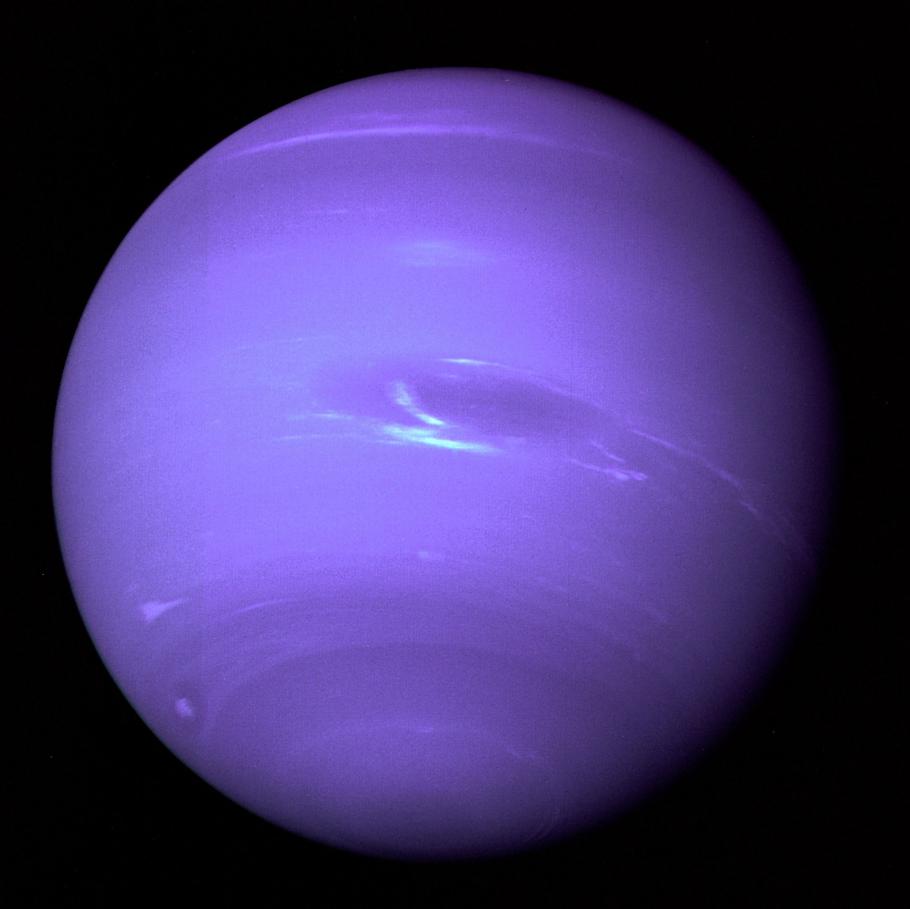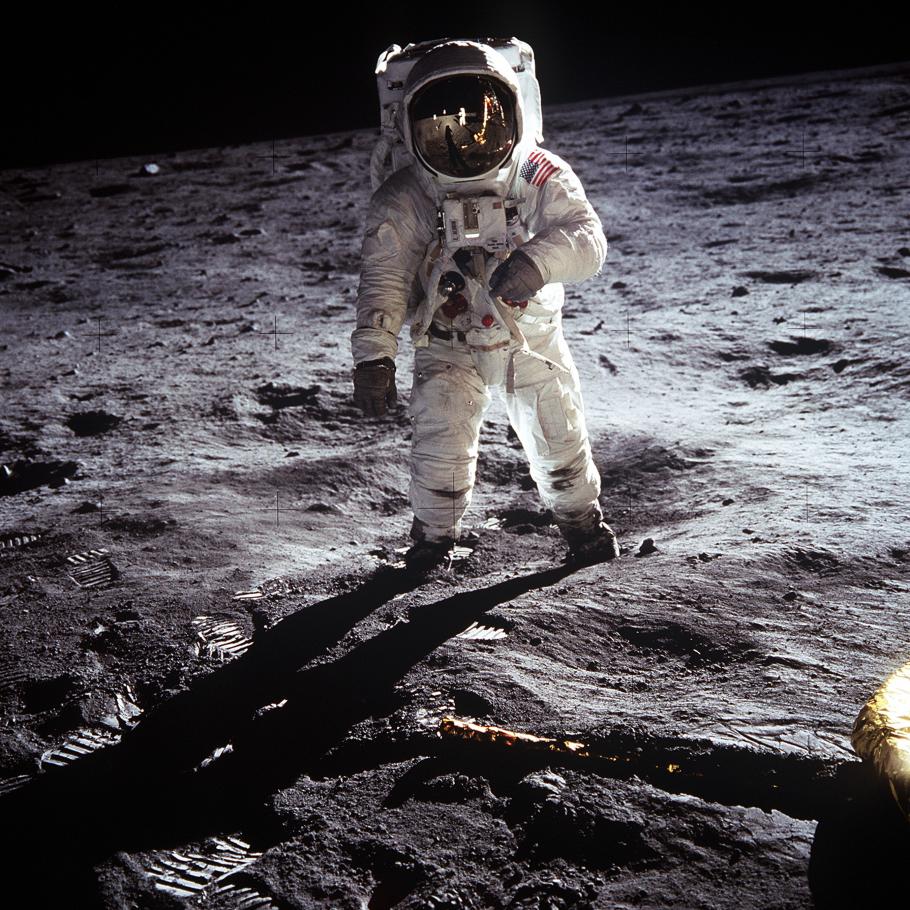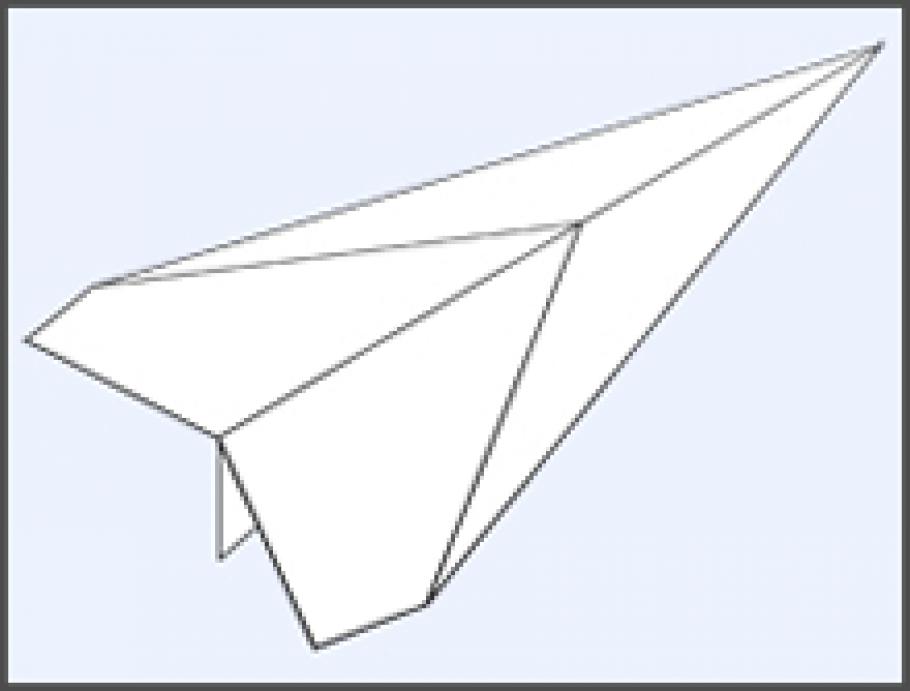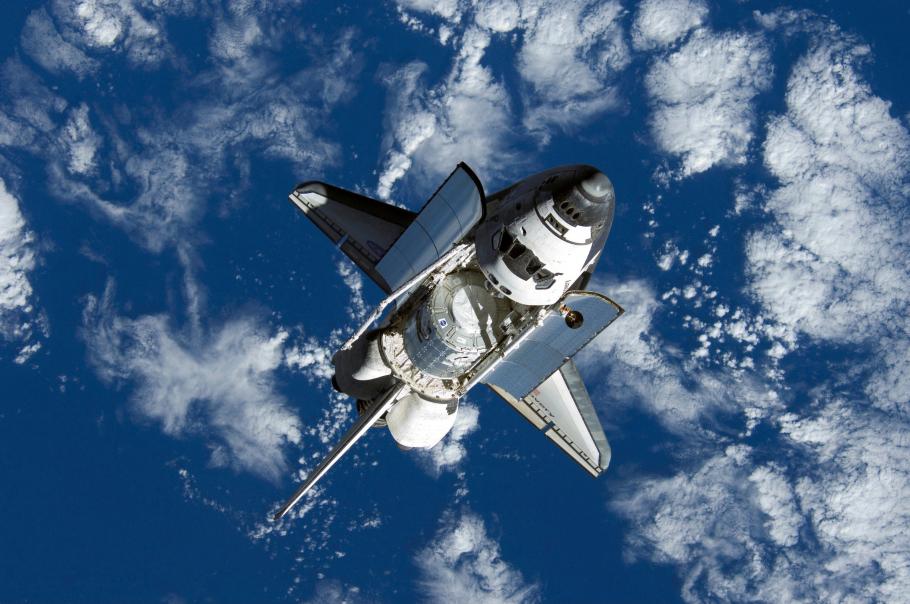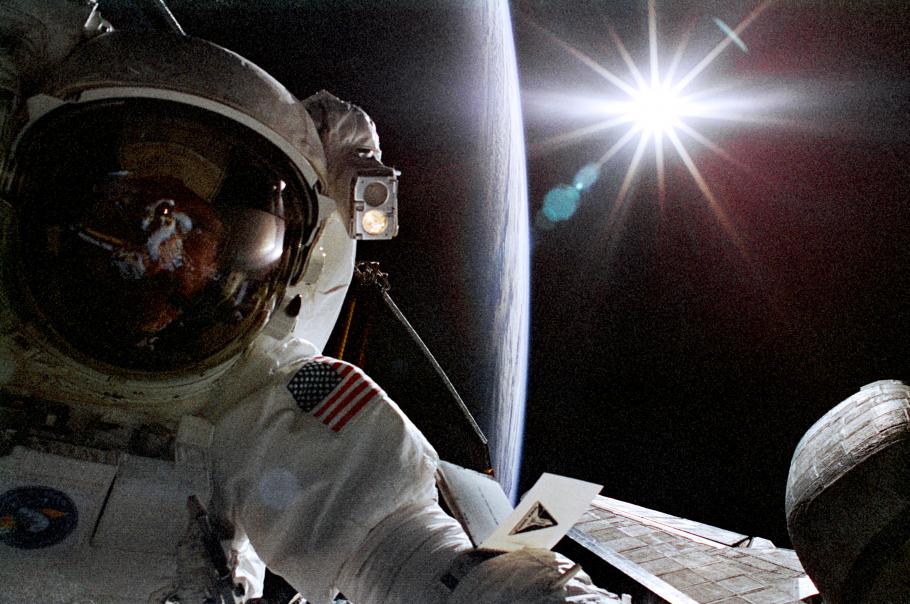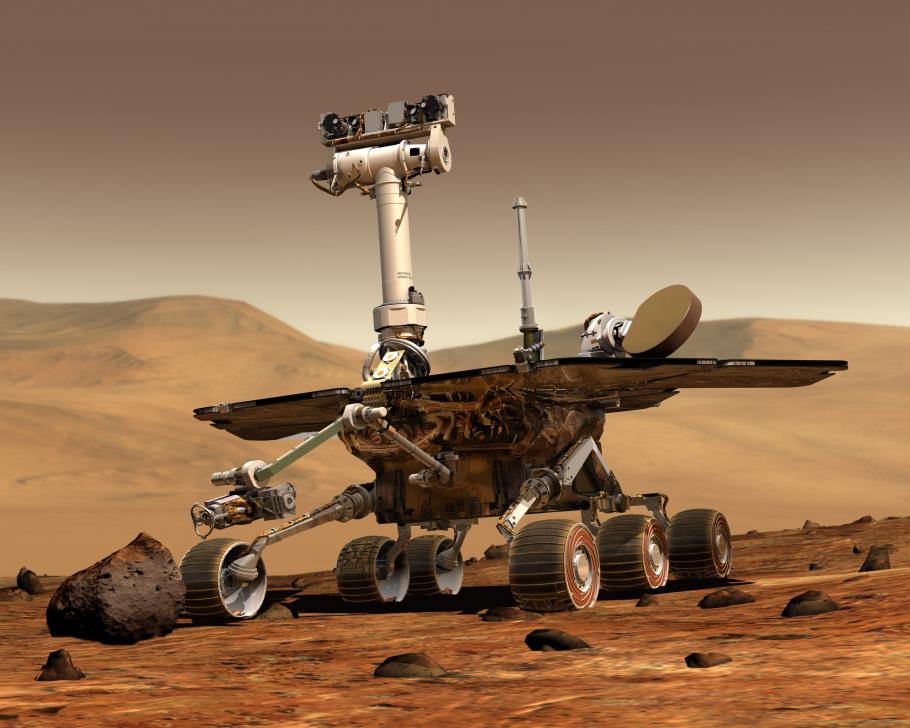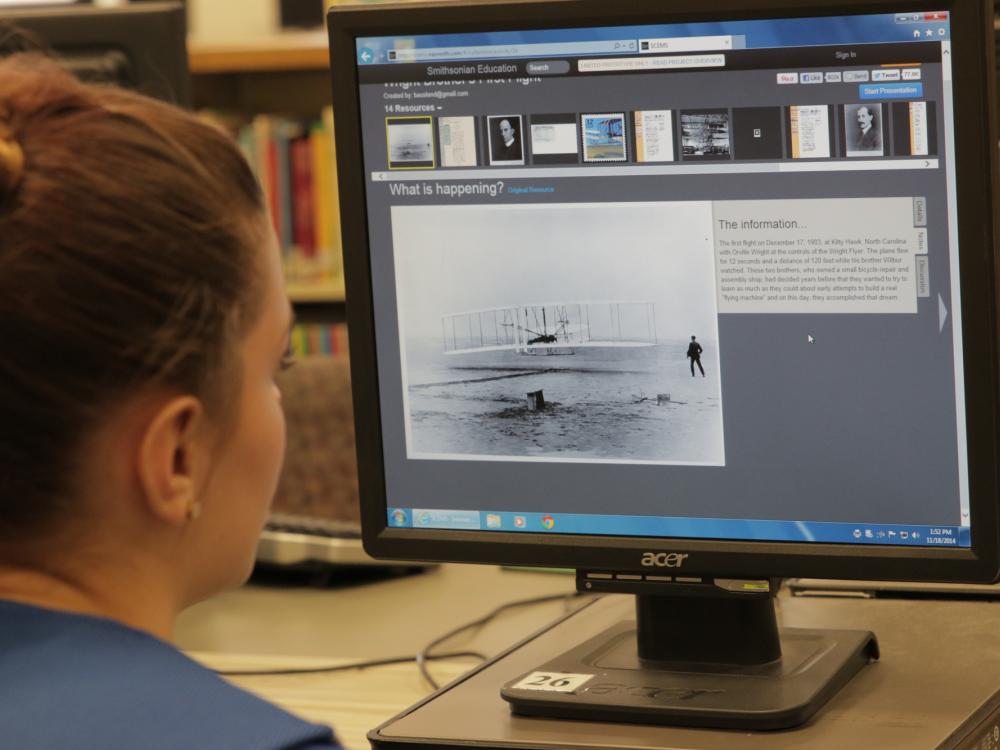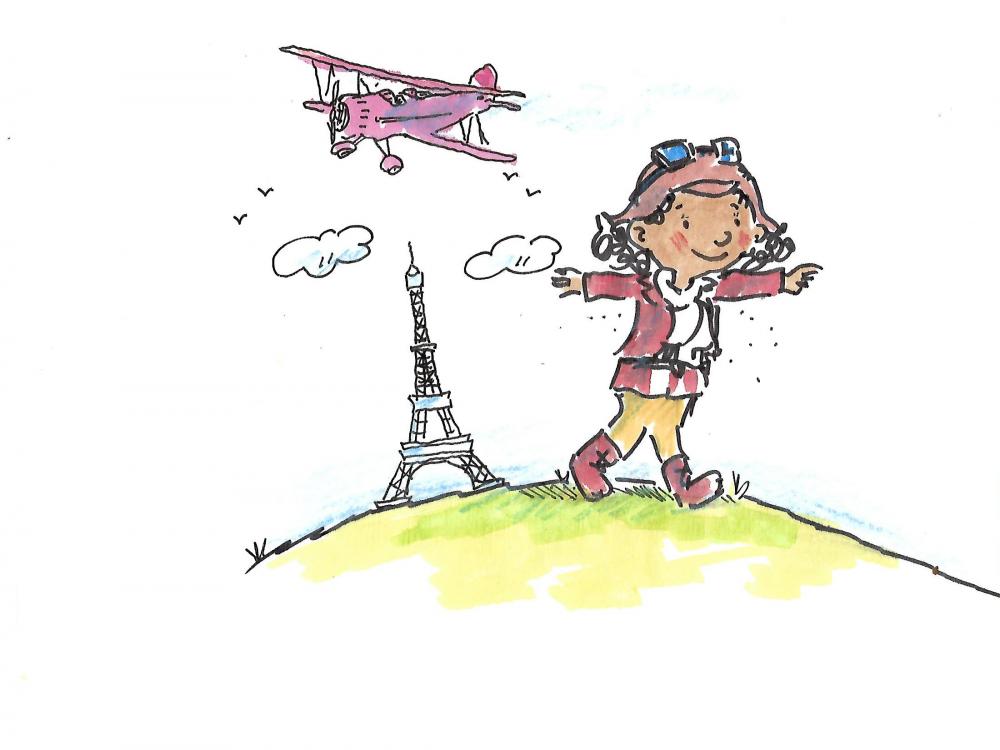These free inquiry-based programs are based on the collections of the National Air and Space Museum and are aligned to the Next Generation Science Standards and explore topics in science, technology, engineering, art, and math (STEAM). Teachers use a combination of demonstrations, experiments, and hands-on activities to assist in the learning process. Groups must reserve programs at least three weeks in advance.
Location: Classrooms at the Steven F. Udvar-Hazy Center
Availability: Tuesday through Friday (October - June)
Program Times: 10:15 am & 11:30 am
Duration: 60 minutes, unless otherwise specified.
Reserved programs are intended for school groups, homeschool groups, and community-based organizations serving youth that meet the minimum program requirements. If you have questions about if your organization meets the Museum’s program requirements, please contact NASMTours@si.edu.
We Can Fly!
Grades: K-2
Duration: 60 minutes
The first successful flight by the Wright brothers in 1903 inspired future generations to learn how airplanes fly. Students will “become a pilot” of their own private aircraft as they learn about the four forces of flight, the basic parts of an airplane, and how they allow for controlled flight. Students will participate in hands-on activities to create their own plane, check its control systems, and prepare for flight!
Discovery & Exploration
Grades: K-2
Duration: 60 minutes
Looking up at the night sky has sparked curiosity and inspired people to explore space, the planets in our solar system, and beyond. Students will follow the journey of early space flight and meet some friends along the way. While exploring characteristics of the planets, students will join Neil Armstrong, Anita the Spider, and the many rovers, spacecraft, and satellites sent to discover more about our solar system. Students will choose a destination and map their own journey by coding robots to discover and travel across the solar system.
To the Moon and Beyond
Grades: 3-6
Duration: 60 minutes
The Moon has fascinated people throughout time. The Apollo 11 mission in 1969 was the first time humans set foot on a celestial body. Through vivid images and hands-on activities, students will explore the phases of the Moon, its relationship to Earth, and the story of the Apollo missions. They will discuss the science of landing humans on the Moon and the challenge of its lifeless environment. Students will work as mission design teams to create a habitat that could support human life on the Moon for future NASA Artemis missions.
Paper Airplane Design
Grades: 3-8
Duration: 60 minutes
How do airplanes fly? Using paper airplanes and scientific methods, students will explore the relationship between an airplane's center of gravity and flight stability. They will make and test their paper airplanes, collect and graph their findings, and reach conclusions on how to improve their designs.
Smart Skies™
Grades: 5-9
Duration: 60 minutes
Note: Maximum of 30 students twice a day due to computer availability.
Smart Skies™ uses a computer-based system to help pilots and air traffic controllers operation the nation’s air transportation system with reduced flight delays and improved efficiency and access. The lab features an interactive Air Traffic Control Simulator that enables students to apply proportional reasoning to make decisions and resolve conflicts in realistic air traffic control problems involving two or more planes. Students will learn about air traffic control systems and engage in challenges to “line up” the planes safely, with proper spacing, on time, at a given intersection of jet routes.
Voyages into Space
Grades: 6-8
Duration: 60 minutes
Houston, we have lift-off… join us as we learn how NASA has conquered the treacherous journey to space and safely brought astronauts home. Students will learn about the early efforts of rocketry and its evolution into the Space Program we know today. Embark on a challenge during the hands-on activity to create your own rocket capable of carrying the heaviest payload possible into space.
Living and Working in Space
Grades: 6-12
Duration: 60 minutes
The more we know about the universe, the more we learn about ourselves. Every NASA mission embodies the spirit of discovery. While living in space might appear to be nothing but fun, some of the known and unknown effects of space can spoil the party. Astronauts encounter a number of biological and psychological hazards that can impact the success of the mission as well as the long-term health of the astronaut. This lab will challenge students to create a pressure suit for their “astronaut” to ensure they have a safe journey to “space” in the vacuum pump. Students will complete this team design challenge to cultivate their critical thinking skills and develop a suit through trial-and-error engineering.
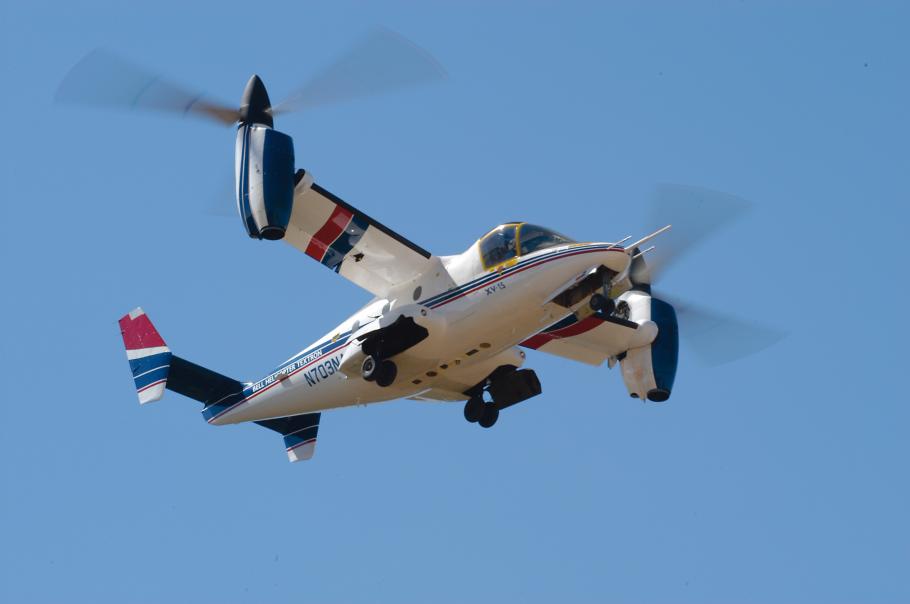
Forces of Flight
Grades: 6-12
Duration: 60 minutes
The first successful flight by the Wright brothers in 1903 inspired future generations to learn more about the forces of flight. Students will discover these forces — weight, lift, thrust, and drag. Demonstrations and activities will bring to life the principles of gravity, air pressure, and air resistance, as well as Newton's Third Law. Students will design, build, and test a simple propeller using the scientific inquiry model.
Mission to Mars
Grades: 6-12
Duration: 60 minutes
From Mariner's first pictures of Mars in 1964 to Perseverance's landing in February 2021, humans have been on a quest to learn about the Red Planet. Students will explore the climate and geology of Mars, along with the challenges of robotic exploration in space. They will work as mission design teams and use budget and science guidelines from NASA to create a spacecraft to fly to Mars.
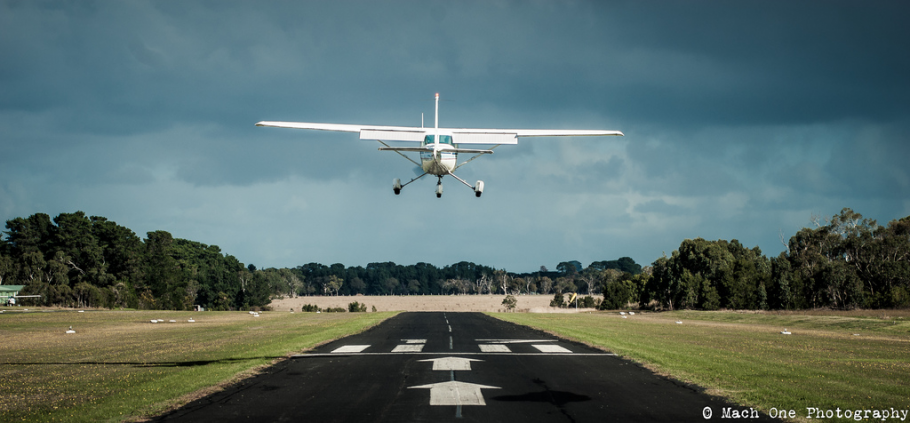
Flight School Math
Grades: 6-12
Duration: 60 minutes
Note: Maximum of 15 students per reserved session, with a maximum of 4 sessions per day due to availability of flight simulators.
Students often struggle to see how math is all around us. Working in pairs, students will use FAA certified flight simulators to learn how flight instruments are used to control and land a plane at Dulles Airport using real world math. Students will collect flight data and graph the descent rate of each flight and use a line of best fit to determine if they were on the correct glide slope.
**Students must to know how to read an analog clock to perform calculations with the altimeter.**
These free inquiry-based programs are based on the collections of the National Air and Space Museum and are aligned to the Next Generation Science Standards and explore topics in science, technology, engineering, art, and math (STEAM). Teachers use a combination of demonstrations, experiments, and hands-on activities to assist in the learning process. Groups must reserve programs at least three weeks in advance.
Location: Classrooms at the Steven F. Udvar-Hazy Center
Availability: Tuesday through Friday (October - June)
Program Times: 10:15 am & 11:30 am
Duration: 60 minutes, unless otherwise specified.
Reserved programs are intended for school groups, homeschool groups, and community-based organizations serving youth that meet the minimum program requirements. If you have questions about if your organization meets the Museum’s program requirements, please contact NASMTours@si.edu.
We Can Fly!
Grades: K-2
Duration: 60 minutes
The first successful flight by the Wright brothers in 1903 inspired future generations to learn how airplanes fly. Students will “become a pilot” of their own private aircraft as they learn about the four forces of flight, the basic parts of an airplane, and how they allow for controlled flight. Students will participate in hands-on activities to create their own plane, check its control systems, and prepare for flight!
Discovery & Exploration
Grades: K-2
Duration: 60 minutes
Looking up at the night sky has sparked curiosity and inspired people to explore space, the planets in our solar system, and beyond. Students will follow the journey of early space flight and meet some friends along the way. While exploring characteristics of the planets, students will join Neil Armstrong, Anita the Spider, and the many rovers, spacecraft, and satellites sent to discover more about our solar system. Students will choose a destination and map their own journey by coding robots to discover and travel across the solar system.
To the Moon and Beyond
Grades: 3-6
Duration: 60 minutes
The Moon has fascinated people throughout time. The Apollo 11 mission in 1969 was the first time humans set foot on a celestial body. Through vivid images and hands-on activities, students will explore the phases of the Moon, its relationship to Earth, and the story of the Apollo missions. They will discuss the science of landing humans on the Moon and the challenge of its lifeless environment. Students will work as mission design teams to create a habitat that could support human life on the Moon for future NASA Artemis missions.
Paper Airplane Design
Grades: 3-8
Duration: 60 minutes
How do airplanes fly? Using paper airplanes and scientific methods, students will explore the relationship between an airplane's center of gravity and flight stability. They will make and test their paper airplanes, collect and graph their findings, and reach conclusions on how to improve their designs.
Smart Skies™
Grades: 5-9
Duration: 60 minutes
Note: Maximum of 30 students twice a day due to computer availability.
Smart Skies™ uses a computer-based system to help pilots and air traffic controllers operation the nation’s air transportation system with reduced flight delays and improved efficiency and access. The lab features an interactive Air Traffic Control Simulator that enables students to apply proportional reasoning to make decisions and resolve conflicts in realistic air traffic control problems involving two or more planes. Students will learn about air traffic control systems and engage in challenges to “line up” the planes safely, with proper spacing, on time, at a given intersection of jet routes.
Voyages into Space
Grades: 6-8
Duration: 60 minutes
Houston, we have lift-off… join us as we learn how NASA has conquered the treacherous journey to space and safely brought astronauts home. Students will learn about the early efforts of rocketry and its evolution into the Space Program we know today. Embark on a challenge during the hands-on activity to create your own rocket capable of carrying the heaviest payload possible into space.
Living and Working in Space
Grades: 6-12
Duration: 60 minutes
The more we know about the universe, the more we learn about ourselves. Every NASA mission embodies the spirit of discovery. While living in space might appear to be nothing but fun, some of the known and unknown effects of space can spoil the party. Astronauts encounter a number of biological and psychological hazards that can impact the success of the mission as well as the long-term health of the astronaut. This lab will challenge students to create a pressure suit for their “astronaut” to ensure they have a safe journey to “space” in the vacuum pump. Students will complete this team design challenge to cultivate their critical thinking skills and develop a suit through trial-and-error engineering.

Forces of Flight
Grades: 6-12
Duration: 60 minutes
The first successful flight by the Wright brothers in 1903 inspired future generations to learn more about the forces of flight. Students will discover these forces — weight, lift, thrust, and drag. Demonstrations and activities will bring to life the principles of gravity, air pressure, and air resistance, as well as Newton's Third Law. Students will design, build, and test a simple propeller using the scientific inquiry model.
Mission to Mars
Grades: 6-12
Duration: 60 minutes
From Mariner's first pictures of Mars in 1964 to Perseverance's landing in February 2021, humans have been on a quest to learn about the Red Planet. Students will explore the climate and geology of Mars, along with the challenges of robotic exploration in space. They will work as mission design teams and use budget and science guidelines from NASA to create a spacecraft to fly to Mars.

Flight School Math
Grades: 6-12
Duration: 60 minutes
Note: Maximum of 15 students per reserved session, with a maximum of 4 sessions per day due to availability of flight simulators.
Students often struggle to see how math is all around us. Working in pairs, students will use FAA certified flight simulators to learn how flight instruments are used to control and land a plane at Dulles Airport using real world math. Students will collect flight data and graph the descent rate of each flight and use a line of best fit to determine if they were on the correct glide slope.
**Students must to know how to read an analog clock to perform calculations with the altimeter.**
STEAM Labs are made possible by the generous support of Barron Hilton.
